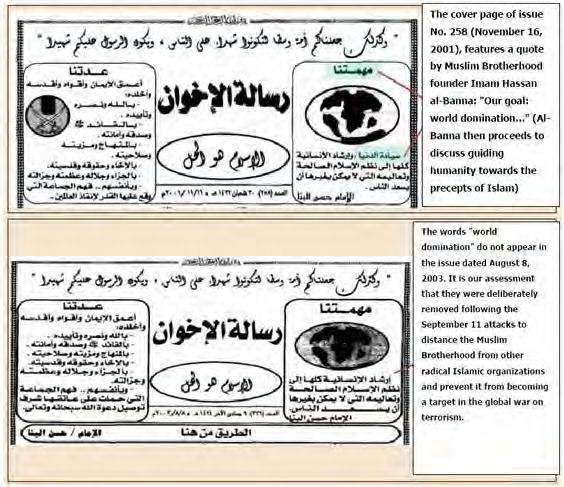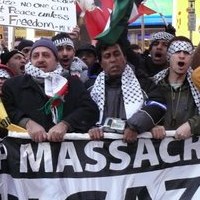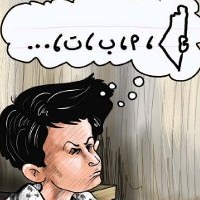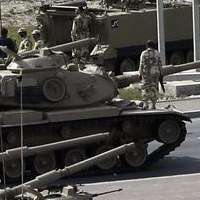![]()
Sun, June 19, 2011 | The Meir Amit Intelligence and Terrorism Information Center
The Muslim Brotherhood – Chapter 10: The Muslim Brotherhood in other Arab countries and in Europe
The Muslim Brotherhood is an Islamic mass movement whose worldview is based on the belief that “Islam is the solution” and on the stated aim of establishing a world order (a caliphate) based on Islamic religious law (Shariah) on the ruins of Western liberalism. With extensive support networks in Arab countries and, to a lesser extent, in the West, the movement views the recent events in Egypt as a historic opportunity. It strives to take advantage of the democratic process for gradual, non-violent progress towards the establishment of political dominance and the eventual assumption of power in Egypt and other Middle Eastern countries.
The Muslim Brotherhood in Arab Countries
Muslim Brotherhood branches started emerging in the Arab world in the 1930s and 1940s. A notable Muslim Brotherhood branch appeared in Syria, once considered the second largest branch after the founding Egyptian movement. Important Muslim Brotherhood branches also emerged and became established in Jordan, Algeria, Sudan, Morocco, Saudi Arabia, Tunisia, and Persian Gulf states. A daughter movement (Hamas) appeared on the Palestinian scene.
Examination of the movement’s conduct in the various countries and the relationships between the branches in Arab countries and their respective regimes shows that they exhibit various patterns of activity. These patterns were influenced by the different social and political conditions in each country and such distinct characteristics as national, ethnic, religious, or tribal tensions.
As a result of the Muslim Brotherhood’s worldview, emphasizing deep social change, and in light of the aggressive policy adopted by the authorities, in most Arab countries the movement focused on building a social infrastructure and preaching Islam (da’wah), exhibiting a great deal of pragmatism and willingness to come to terms with persecution by the regimes to ensure its long-term survival.
In some countries the movement integrated into political establishments, mostly as a tolerable opposition. For example, in Jordan, even though the movement traditionally posed a potential threat to the Hashemite regime, at times it was integrated into the government; in Sudan the movement oscillated between integration into government institutions and influence on that country’s politics on one hand, and persecution and suppression on the other; in Algeria the movement eventually integrated into the government system of President Bouteflika; in Morocco the movement split into a party integrated into government institutions and an oppositionist group persecuted by the authorities; in Saudi Arabia the regime granted asylum to Muslim Brotherhood activists while maintaining a wary attitude towards them; in Qatar the movement won the support of the authorities; in Kuwait it integrated into parliamentary life.
In Tunisia, Al-Nahda, a Muslim Brotherhood-affiliated party, was persecuted by the authorities until the return of its leader, Rashid al-Ghannushi, following the Jasmine Revolution. In Syria, however, in the 1970s and the early 1980s, the Muslim Brotherhood led a military uprising, particularly in the city of Hama, which was brutally suppressed by the Hafez Assad regime; in the Palestinian Authority, Hamas, the Muslim Brotherhood’s daughter movement, took part in the 2006 parliament elections following which it took over the Gaza Strip by force (in 2007) and neutralized its opponents, Fatah and the Palestinian Authority. The Gaza Strip is an exceptional example where an Islamist government entity was established through a military coup and is ruled by a movement affiliated with the Muslim Brotherhood.
As a cautionary measure and to avoid becoming involved in day-to-day politics, the movement operates on the parliamentary scene in most Arab countries through front parties affiliated with it, which have become integrated into the political game: for example, the Muslim Brotherhood in Jordan established the Islamic Action Front; in Algeria it established the Mouvement de la société pour la paix (MSP); in Sudan it established the Islamic Charter Front (ICF) and later the National Islamic Front (NIF). In Lebanon the Muslim Brotherhood operates through an organization named Al-Jama’ah al-Islamiyya; in Morocco it established the Moroccan Justice and Development Party (PJD); in Tunisia it established the Al-Nahda party, persecuted by the authorities; in Saudi Arabia it was prohibited from establishing a party; and in Kuwait it established the Islamic Constitutional Movement. In Syria, however, the movement has retained its Muslim Brotherhood identity, even though in the past year its leader has expressed willingness to turn it into a political party.
In some countries (Jordan, Morocco, Kuwait), the Muslim Brotherhood’s integration into government institutions has been a catalyst for internal tension on the backdrop of disagreements between pragmatic factions and radical factions, preferring to be in the opposition and confront the regime. In other countries, such as Sudan, the movement has occasionally enjoyed political influence but has been plagued by persecution and suppression after internal upheavals in the senior echelons of the regime.
The Muslim Brotherhood in Egypt and other countries in the Arab world is a participant in the current revolutionist awakening. However, decades of persecution and oppression by Arab regimes have taught it to keep a low profile in public and on the media.
Therefore, it adopts cautious tactics, reflected in playing down and concealing its radical ideology, presenting a moderate façade and avoiding blunt public and media remarks. In some cases, it prefers to integrate into a broader coalition of social opposition, youth movements, and left-wing movements, all sharing expressions of protest against the various regimes.
Even so, it can be estimated that if and when such expressions of protest mature into deep socio-political changes, the Muslim Brotherhood will abandon its current cautious conduct, striving to become, in those countries, a legitimate, prominent political player striving to enforce its Islamic agenda and become a dominant factor among the regimes and societies of the various Arab countries.
The Muslim Brotherhood in European countries
The main catalyst for the movement’s spread beyond Egypt, including European countries, was the suppression campaign launched against it by Egypt’s President Gamal Abdul Nasser in 1954. In the 1950s, two large, well-organized Muslim Brotherhood groups fled from Egypt to Saudi Arabia and Qatar. A third, less cohesive group of Muslim Brotherhood activists fled to the U.S. and several European countries, including West Germany. The Muslim Brotherhood currently claims to have presence in over 80 countries worldwide.[73]
In Germany, the Muslim Brotherhood first mingled with the Muslim community, and then established a presence on university campuses and with left-wing opposition activists. In years to follow, the Muslim Brotherhood gradually took hold in other European countries, becoming a distributor of radical Islam and de-facto representative of Muslim immigrant communities. However, the various bodies and activists in Europe usually tend to deny belonging to the Muslim Brotherhood, particularly after the September 11 terrorist attacks.
Using financial aid from Persian Gulf countries (which continues even now), the movement expanded its da’wah network in Europe and the U.S. by establishing banks, mosques, research centers, Islamic institutions, and social and educational institutions.
These are involved in the spread of the movement’s radical-political Islam in European Muslim communities. The most prominent Islamic centers in Europe directly or indirectly affiliated with the Muslim Brotherhood are currently in Britain, France and Germany (for a long time, Munich was the headquarters of the movement’s activities). The major institutions in these countries include the Islamic Society of Germany (IGD), France’s Union of Islamic Organizations, and the Muslim Association of Britain (MAB).
The Muslim Brotherhood in Europe seeks to turn Islam into the dominant force among Europe’s multi-cultural society, as part of the overarching vision of a global Islamic takeover. Yusuf al-Qaradawi, a senior Sunni cleric affiliated with the Muslim Brotherhood, has recently expressed his confidence that Islam will eventually take over Europe — not by means of war, however, but through preaching and education efforts (da’wah).[74] He has argued that “Islam will return to Europe as a conqueror and victor, having been expelled twice”. He qualified his statement, however, by saying that “it is possible that the next conquest, Allah willing, will take place by preaching and ideology”.[75]
One expression of the ultimate goal can be found in Risalat al-Ikhwan, the Muslim Brotherhood organ in Britain, whose cover page featured a world map and a quote by Muslim Brotherhood founder Hassan al-Banna: “Our goal: world domination”. The phrase “word domination” was apparently removed sometime in 2003 (possibly due to the Muslim Brotherhood’s concerns over drawing the attention of UK law enforcement authorities after the September 11 terrorist attacks).
The Muslim Brotherhood’s Risalat al-Ikhwan before and after removing the quote about world domination
The European Muslim Brotherhood’s stance towards Israel
As in Arab countries, the Muslim Brotherhood in Europe is a hostile movement towards Israel, which supports Hamas, denies the legitimacy of the Palestinian Authority, and strongly opposes the peace talks between Israel and the Palestinian Authority and the signs of normalization between Israel and Arab countries (primarily Egypt and Jordan). According to its ideology, “Palestine” is an Islamic endowment all of whose territory should be used to establish an Islamic Palestinian state and accommodate all the refugees who fled in 1948.
These fundamental views have been reflected in a continuing political and media struggle against the peace process and the signs of normalization; assistance to the Hamas administration in the Gaza Strip by sending flotillas and convoys while joining forces with radical left-wing elements in Europe based on shared hostility towards Israel; and taking part in the delegitimization campaign against Israel, where the European Muslim Brotherhood (particularly in Britain) and in Arab countries plays a key role (as witnessed in the Mavi Marmara incident).
Summary
The Muslim Brotherhood in Europe is not directly involved in terrorist attacks against Israel or the West, and in many cases its affiliated organizations and activists refrain, for security considerations, from explicitly identifying themselves as belonging to the Muslim Brotherhood. The Muslim Brotherhood’s cautious approach is designed to facilitate its freedom of action without exposing itself to the reaction of local security services in European countries. European countries have allowed the Muslim Brotherhood existence and activity, in stark contrast to Al-Qaeda and global jihad, both targets for counter-activities conducted by the various European countries.
Even so, it is our assessment that the Muslim Brotherhood is a potential threat to Europe and the Western countries where it operates, for several reasons: the radical Islam it propagates contributes to the segregation of the local Muslim communities, making it more difficult for Muslims to integrate into local societies and absorb the liberal and democratic values of the West; the blatant propaganda it spreads against the West and its values stirs feelings of alienation and non-belonging among local Muslim populations; in addition, young people from all over Europe exposed to the radical Islamic ideology of the Muslim Brotherhood are a potential for recruitment to global jihad organizations.
Indeed, in recent years there have been terrorists with Western citizenship who at some point in their lives were educated in institutions affiliated with the Muslim Brotherhood’s da’wah, or underwent radical Islamization through the internet (a process of “jihadization”) and eventually turned to the path of terrorism of global jihad.
This comprehensive analysis of the Muslim Brotherhood (by ITIC) consists of 12 chapters. All 12 chapters are listed below:
Chapter 1: The historical evolution of the Muslim Brotherhood in Egypt
Chapter 2: The ideology of the Muslim Brotherhood
Chapter 3: The Muslim Brotherhood’s education, preaching, and social activity
Chapter 4: The structure and funding sources of the Muslim Brotherhood
Chapter 6: The Muslim Brotherhood’s stance on the Palestinian-Israeli conflict
Chapter 7: The development of political discourse in the Muslim Brotherhood and the 2007 election platform
Chapter 8: Profiles of prominent Muslim Brotherhood figures in Egypt
Chapter 9: The Egyptian Muslim Brotherhood’s ties to its branches in Middle Eastern and Western countries
Chapter 10: The Muslim Brotherhood in other Arab countries and in Europe
Chapter 11: A profile of Sheikh Dr. Yusuf al-Qaradawi
Chapter 12: Islamic jihadist organizations in Egypt ideologically originating in the Muslim Brotherhood
You can download the full study in PDF-format here
Notes:
[73] Ehud Rosen, “Mapping the Organizational Sources of the Global Delegitimization Campaign against Israel in the UK”, published in late 2010 on the Jerusalem Center for Public Affairs website, hereinafter “Ehud Rosen”.
[74] Ehud Rosen, p. 12.
[75] Special Dispatch No. 447, Ehud Rosen, MEMRI, December 6, 2002.



 RSS
RSS











The Muslim Brotherhood in other #Arab countries and in #Europe | #Egypt #Islamism http://bit.ly/pqdqI7
[…] Chapter 10: The Muslim Brotherhood in other Arab countries and in Europe […]
[…] Chapter 10: The Muslim Brotherhood in other Arab countries and in Europe […]
[…] Chapter 10: The Muslim Brotherhood in other Arab countries and in Europe […]
The Muslim Brotherhood in other Arab countries and in Europe … http://bit.ly/q6Ibbf #eu #europe
The Muslim Brotherhood in other Arab countries and in Europe … http://bit.ly/q6Ibbf #eu #europe
The Muslim Brotherhood in other #Arab countries and in #Europe | #Egypt #Islamism http://bit.ly/pqdqI7